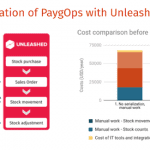Scaling the Last-Mile Distribution Industry With Data-Driven Lending
In emerging and remote marketplaces across the globe, low-income consumers rely heavily on last-mile distributors (LMDs) for access to life-changing products ranging from clean cookstoves to smartphones. To take a key example, solar-powered products and devices, like solar home systems, have become instrumental in ongoing efforts to meet energy demand in under-electrified regions. And this demand is significant: The market for off-grid solar products across sub-Saharan Africa and the Asia-Pacific region consists of 716 million people without electricity and more than 1 billion people with an unreliable energy grid.
However, despite the critical role they play in the sale and distribution of such important products in these marketplaces, LMDs struggle to access the funding they need to scale. Fortunately, data-driven innovations in lending are emerging to close this financing gap, providing LMDs with the capital required to grow their businesses and reach more last-mile consumers. Below, we’ll explore the funding challenges these businesses face — and how a data-driven approach to lending can help.
The Pursuit of Sustainable Funding: A Long-Term Challenge
According to the Global Distributors Collective (GDC)’s) 2019 Last Mile Distribution: State of the Sector report, LMDs receive a majority of their equity and debt backing from family, friends, angel investors, crowdfunders or the founders themselves. While they are reasonable sources of seed capital, these sources of funding are generally insufficient to support growth and scale in a capital-intensive business. This explains why GDC members consistently cite limited access to financing as their number one challenge. Prior to COVID-19, 94% of GDC members were looking for additional financial support, with that need remaining largely consistent throughout the pandemic.
Unfortunately, the funding gap described above is disproportionately felt by locally owned and women-owned LMDs, as well as those serving rural communities. Even before COVID-19, the majority of investment funds flowing into the last-mile sector were allocated toward foreign-owned energy access companies. This disparity has persisted throughout the pandemic, with 75% of the off-grid capital committed in 2020 channeled into just three international companies (as of August 31, 2020). According to Emma Colenbrander, head of the Global Distributors Collective, this trend is particularly problematic due to the fact that under-funded, locally owned LMDs are often better equipped to service rural regions, given their understanding of local demand and networks. Without access to adequate funding, smaller, more localized LMDs are at an increased risk of losing their ability to provide life-changing products and employment opportunities to vulnerable communities.
Addressing Barriers to Debt Finance for LMDs
Debt capital is especially important for LMDs looking to scale their pay-as-you-go (PAYG) businesses. PAYG is a popular sales model for LMDs serving low-income consumers. The model requires LMDs to make upfront purchases of consumer devices (like cookstoves, solar home systems or smartphones), which they then sell to end-users through a “lease-to-own” model, in which the devices require periodic, incremental payments to remain active until they’re fully paid off and owned by the end-user. As their sales increase, LMDs need capital to finance their lending on a growing portfolio of PAYG receivables, while also continuing to refresh their supply of inventory to sell to new customers. Debt funding is crucial to enabling this model, yet there are a series of hurdles inherent to the PAYG last-mile sector and its unique market conditions that make lenders reluctant to underwrite LMDs.
First, LMDs often struggle with limited financial management capacity and a lack of detailed portfolio quality data. Much of the data they do provide to lenders is self-reported in the context of weak regulatory environments. As a result, it has historically been difficult for investors to gather high-quality, verified data to assess an LMD’s performance and the potential risk of its PAYG portfolio. Second, the cost of underwriting, transacting and monitoring loans with LMDs in emerging markets is often high relative to the small size of the transaction. Financiers can underwrite transactions that are 10 times the size for a similar level of effort. Finally, limited access to equity and grant financing often leaves LMDs with weak balance sheets, preventing them from taking on more debt without becoming over-leveraged.
Building a Data-Driven Approach to Lending in Last-Mile Markets
Fortunately, new solutions hold promise when it comes to addressing the funding shortages that LMDs in emerging markets face. Lenders are leveraging new data sources to assess risk and make informed underwriting decisions when investing in smaller last-mile businesses. As one example, at Angaza, we’ve joined forces with impact fund manager and advisor SIMA to create the SIMA Angaza Distributor Finance Fund (DFF), a data-driven debt fund launched to accelerate the flow of capital to LMDs. The fund has been anchored by investments from the Shell Foundation, USAID, FCDO, Power Africa, the Skoll Foundation and Ceniarth.
Angaza’s software platform serves over 200 distributors of life-changing products across 50 countries. As a provider of Software-as-a Service (SaaS) technology designed specifically for last-mile businesses, our data analytics capabilities and unparalleled PAYG dataset provide unique visibility into LMD performance, PAYG asset quality and growth potential. As a fund manager, SIMA has deployed more than $100 million into increasing energy and financial access over the last two years. In addition to its underwriting expertise, it has a deep knowledge of the business fundamentals of PAYG distribution, having made loans to 20 off-grid companies with ticket sizes ranging from $150,000 to $10 million. By combining Angaza’s wealth of data on real-time sales and cash collections with SIMA’s extensive experience lending to businesses servicing off-grid communities, DFF aims to extend affordable credit to LMDs and increase commercial investors’ interest in the sector.
A Demonstrated Impact on Under-Financed LMDs
The efforts behind DFF are already paying off, with five last-mile solar distributors receiving loans in recent months. For instance, Deevabits Green Energy of Kenya, one of DFF’s first portfolio companies, distributes solar energy products to rural communities via a PAYG billing model. Despite consistently surpassing sales goals, Deevabits found it challenging to finance growth. Borrowing from local commercial banks was not a viable solution for the small company due to excessively stringent collateral requirements. However, since receiving DFF funding in September 2020 — alongside financial management support funded by USAID’s Power Africa, a DFF partner — Deevabits has been on an impressive growth trajectory, with sales increasing more than twofold since its last fiscal year.
Supporting Local Entrepreneurs and Closing the Gender Gap in Last-Mile Market
Supporting local businesses is a top priority, as DFF furthers its goal of bringing the data revolution to the last-mile sector while infusing companies like Deevabits with the capital they need to reach more underserved consumers. By utilizing Angaza’s PAYG data, DFF is able to segment LMDs based on their cash flows, asset quality and other key operating metrics, allowing it to home in on high-potential borrowers. Leveraging SIMA’s underwriting expertise, DFF reviews this verified financial data, alongside self-reported company information, to evaluate a potential borrower’s underlying business performance and trends. When applying this data-driven approach to sourcing and underwriting, it gives particular focus to locally-owned businesses in order to further the empowerment of small and medium LMDs.
Along with local ownership, the fund also focuses on the issue of gender inclusion in the last-mile sector, as women are often most impacted by a lack of access to clean energy solutions. Despite their clear need for clean energy, research has found that the energy access sector fails to integrate women’s experiences and expertise, exacerbating the gender gap in energy access. To help address this inequity, DFF also applies a gender lens to its investment process, in order to support companies that are founded or led by women, excel in employing and promoting women, or primarily serve female customers. As part of this approach, Power Africa is developing Gender Action Plans for DFF portfolio companies to help guide them in advancing gender equity. Additionally, the impact measurement company 60 Decibels, another DFF partner, is conducting end-customer research with a special focus on gender to help portfolio companies understand how they can better serve female customers.
Data Transparency is the Key to Accelerating Sector Growth and Inclusion
DFF remains committed to democratizing access to data, to eliminate funding bias in the last-mile sector and empower local and women-owned LMDs with the resources they need to scale their operations. Eventually, the fund seeks to standardize the data needed to assess LMD investment opportunities, in order to provide LMDs with full transparency into the underwriting process. With this knowledge, LMDs will be better able to understand how they are being evaluated by potential lenders, which will enable them to improve upon the benchmarks that translate directly into more favorable loan interest rates. In the future, this work will ideally provide smaller-scale LMDs in often-overlooked countries and regions with access to the data and funding they need to efficiently scale their businesses and grow their networks. In turn, this will allow them to better serve vulnerable communities with the products they need to improve their lives and build their incomes while moving the world closer to achieving the Sustainable Development Goals.
Erin Junio is a Content Specialist at Angaza.
Photo resized from original. Credit: Patrick Bentley/SolarAid



